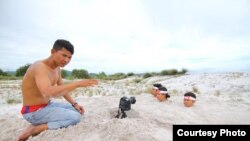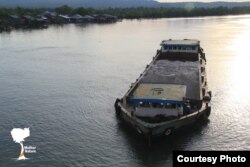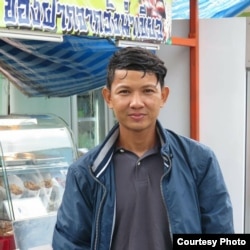WASHINGTON D.C. — In Cambodia, the large-scale, unchecked exploitation of natural resources such as land, timber and minerals has long had heavy impacts on the environment, and has prompted environmental activists and affected communities to campaign against the companies involved.
Challenging well-connected business interests, however, carries great risk in Cambodia and activists who do have often been targeted by the government of Prime Minister Hun Sen and his long-ruling Cambodian People’s Party (CPP).
One of them is Hun Vannak, 36, a campaigner with environmental NGO Mother Nature Cambodia.
He spent five months in prison earlier this year, together with his colleague Doem Kundy, 21, after LYP Group Company of businessman and CPP Senator Ly Yong Phat reportedly complained about their efforts to document sand transport in southwestern Cambodia’s Koh Kong Province.
“I was innocent but they used their power to abuse me,” Hun Vannak told VOA in a phone interview from Cambodia. He said the punishment has only strengthened his resolve, adding, “After my release, I want to protect the environment even more.”
Joining Mother Nature
Before he became an activist Hun Vannak ran his own construction company in Phnom Penh, but he said he had long wanted to stop the rampant environmental damage and social injustice plaguing Cambodia, in particular after prominent campaigners like political analyst Kem Ley and environmentalist Chut Wutty were assassinated.
In 2015, he began volunteering in a campaign against the Don Sahong Dam, a mega-project developed on the Mekong River in southern Laos that could severely impact the downstream fisheries on which many rural Cambodians depend.
An encounter during the campaign with the co-founder of environmental NGO Mother Nature Cambodia, Alex Gonzalez-Davidson, a Spanish national who was deported for his activism by Cambodian authorities in 2015, inspired him to support and eventually join the group full time.
“As long as we have natural resources left [to protect] we can do more work. That’s why I decided to join Mother Nature,” said Vannak.
In recent years, Mother Nature has launched some of Cambodia’s most effective civil society campaigns against deforestation, hydropower dams and sand extraction. This has included highly visible grassroots protests, exposing alleged resource corruption, and the release of video evidence of environmental damage on social media.
Retribution by authorities
Cambodian authorities have responded to Mother Nature’s campaigns with a mix of heavy retribution and sometimes public concern for the issues raised.
The NGO has alleged that large-scale sand extraction is illicit, unregulated and causes severe damage to fisheries, coastlines and riverbanks, and the livelihoods of local communities.
A 2016 investigation by the group showed some 60 million tons of sand exports to Singapore had gone unreported in Cambodian trade statistics since 2005, suggesting vast illicit exports. This prompted the government to announce a temporary export ban on sand and to welcome civil society findings on the practice.
But when a similar investigation in September 2017 found $30 million of illicit sand export to Taiwan had gone unreported, the authorities hit back. Within days after the report’s release, Hun Vannak and Doem Kundy were arrested and Mother Nature was deregistered as a NGO.
‘We didn’t have enough room to sleep’
The pair had been filming ships transporting sand off the coast of a special economic zone operated by Ly Yong Phat when they were arrested and charged with “incitement to commit a felony” and unauthorized filming of a person “in a private place.” The International Federation for Human Rights called their detention unlawful and the charges spurious.
They were found guilty and given a suspended prison sentence of seven months and released in February 2018 after five months in pre-trial detention.
Hun Vannak said conditions in Koh Kong Prison were harsh, explaining that 20 prisoners were required to squeeze into an extremely small cell.
“We didn’t have enough room to sleep, so we slept by crossing our legs on each other,” he said. “Some conditions violated human rights principles, including our food and living conditions. We didn’t have clean water (to wash), I got skin infections.”
“If my family didn’t give me money [to buy food from outside], I think it would be difficult to survive in prison because the prison food smells like raw fish,” he added.
He insisted high-ranking officials order his arrest to intimidate Mother Nature activists and the communities that worked with them.
“I collected information, interviewed people, filmed videos,” Hun Vannak said. “I was convicted because I was too brave [to challenge LYP Group]… I was told by the local police that I did nothing wrong, but they had to follow the … order to arrest me.”
‘No regrets’
Still, Hun Vannak said he has “no regrets” over his prison term and remains committed to protecting the environment, even though he continues to face intimidation, such as when he travelled to Thailand recently and was told by Cambodian immigration officials that he is on watchlist.
“I am confident that what I do helps other people who are abused and helps save the natural environment. We experience many challenges and risks, but we see great outcomes, which has motivated me to keep struggling,” he said.
His mother Ty Marry, who publicly campaigned for his release from prison, said she worried about his safety but respects his dedication
“I told him to be careful not to be arrested again… We protect the environment but it might affect the people in power and the elites. He told me that it should not be a problem. He loves [protecting the environment] and continues doing it,” she said.
Mot Kimry, a fellow environmentalist, admires Hun Vannak’s courage. “His work is dangerous… but has a positive impact for our society, because people in Phnom Penh don’t know about [sand extraction] and the media might be less willing to report on these issues,” he said.
Mother Nature, which is now run from exile by Gonzalez-Davidson, is now trying to find new ways of highlighting environmental problems without endangering its staff, most recently by releasing a campaign video narrated by a Khmer-speaking, traditional garb-wearing puppet.
Hun Vannak plans to continue his activism to protect Cambodia’s environment and to support rural communities whose traditional livelihoods suffer from the negative impacts of resource exploitation.
“The power and movement of the people who love the environment still persists, this means that we are still moving forward,” he said.






